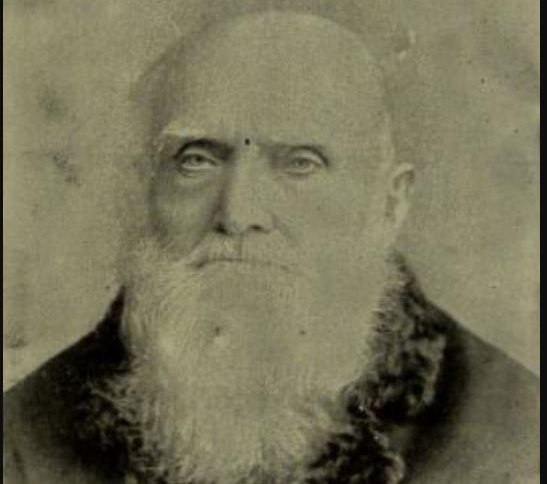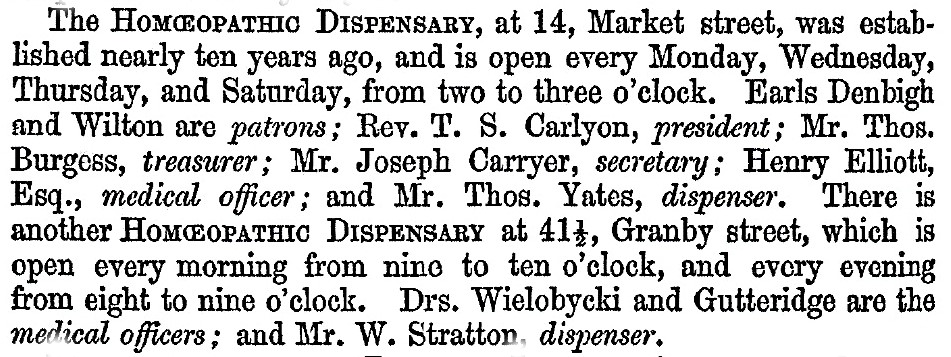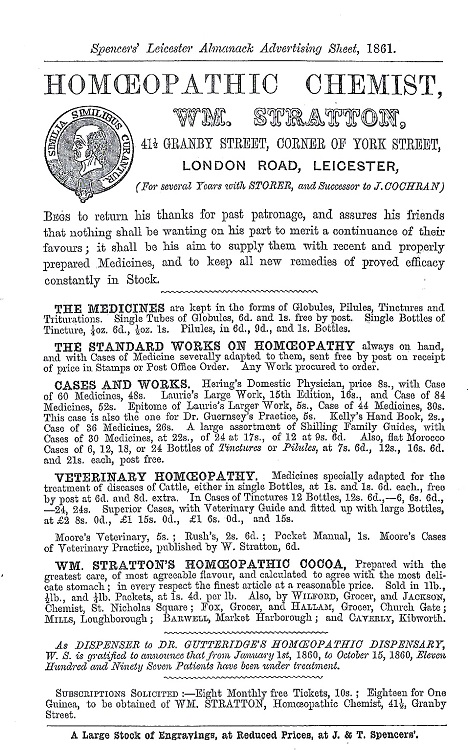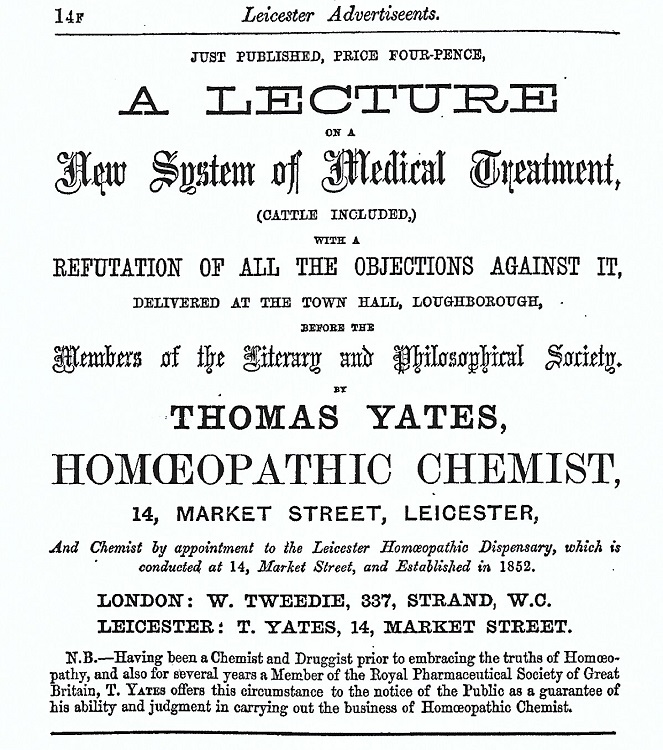Sunday 18 February 2024
A Polish homeopath in Leicester
LAHS Newsletter and Reviews Editor, Cynthia Brown tells the intriguing story of Severin Wielobycki, a 19th century Polish homeopath who lived and worked in Leicester during the 1860s.
While doing some research into homeopathy in Victorian Leicester I came across the name Severin Wielobycki among its practitioners in the early 1860s. It suggested that he might be Polish, something confirmed by his obituary in the British Medical Journal in September 1893, and I was intrigued to know how and why he came to Leicester. None of the sources I uncovered shed any light at all on this – but they did reveal a great deal that may still be of interest about his life and medical career.

The son of a judge, he was born in 1793 in the province of Volinia [modern spelling Volhynia], then part of Poland and now of Ukraine. As a captain in the Volinian Volunteer Cavalry he fought in the November Uprising against Russian rule in 1830-31, during which he ‘had often to sleep in the open with the snow on the ground, which exposure originated a deafness which lasted during the rest of his life’. After fleeing to avoid capture he made his way to Edinburgh, where he supported himself by teaching French.
In 1839 he was joined by his younger brother Dionysius, and both graduated from the University of Edinburgh with a degree in medicine, Severin in 1841 and Dionysius two years later. Severin also qualified for the diploma of the Edinburgh College of Surgeons. In due course both became naturalised British citizens, but while Dionysius remained in Edinburgh, working for some time as assistant surgeon at the Royal Maternity Hospital, Severin spent the first ten years of his career in Nova Scotia, Canada before returning to Britain.
His stay in Leicester seems to have been relatively brief. In 1861 he was living in Edinburgh, where the Scottish Census of that year identifies him as a lodger in the household of Isabella Angus, a doctor’s widow, and describes him as ‘M.D. in practice’. In August that year he married Helen Gerrard in Edinburgh, and appears to have moved to Leicester soon after: in Slater’s Directory of Leicestershire in 1862 he is listed under ‘Physicians’ as ‘homeopathic’, at 26 Princess Street, not far from New Walk.
In White’s Directory of Leicestershire and Rutland in the following year he appears alongside Dr Richard Gutteridge, a graduate of the University of Glasgow, as one of the medical officers at the Homeopathic Dispensary at 41½ Granby Street. This was established in 1855 at 25 Granby Street, on the corner of East Street, and advertised itself as ‘for the benefit of the Working Classes’, opening every morning from 9 – 10 am and 8 – 9 pm every evening. This distinguished it from the Homeopathic Dispensary at 14 Market Street, established three years earlier under the patronage of the Earls of Denbigh and Wilton, and open from 2 – 3 pm on four days a week.

In 1863 and 1864 Severin Wielobycki was living at Alma Villas, identified in a directory of 1870 as 99 – 101 London Road, between De Montfort Street and what is now University Road. He does not appear in any local directory beyond this, and according to the BMJ he retired from medical practice in 1865 at the age of 72. His whereabouts over the next few years are unclear. In each year from 1866 – 1869 in one section of The Medical Directory his address is given as 55 Queen Street, Edinburgh, that of his practice before moving to Leicester; but he also appears in the same registers under ‘Medical Practitioners Registered Abroad and Registered Non-Residents’, presumably in the category of ‘gentlemen who, on account of the uncertainty of their places of residence… cannot be included in the ordinary lists’. By 1871, however, he was living with Helen in Marylebone, London and is identified in the Census as ‘Dr. of Medicine Edinburgh (not practising)’.

He continued to write medical papers, and for several years before his death in September 1893,at the age of 100 years and eight months, he was vice-president of the Society for the Study of Inebriety. This was founded in 1884 to study, amongst other things, the relationship between alcohol and other intoxicants on heredity, eugenics and the ‘deterioration’ of the race. At a reception by the Society to mark his 100th birthday he was presented with an illuminated address acknowledging his ‘practical demonstration of the healthfulness of abstinence from all intoxicants and narcotics’. ‘In order to live a hundred years and more’, he said of the occasion:
it requires to know very much about how to live carefully. The first thing is not to take intoxicants because they are, in small or large doses taken every day, sure to bring disease and death… The second thing is not to use tobacco, which is a very poisonous thing. It injures the eyes and causes blindness… It stops the growth in young men, blunts the age in middle age, and causes paralysis in an old man. The third thing is not to take much animal flesh. It causes many diseases…
He was said to have abstained from all intoxicants for 60 years, had never smoked tobacco, and practised vegetarianism since 1878. Until broken down by influenza’ three years before he died, he was said to be ‘a ruddy, erect, soldierly-looking, vigorous man, walking twelve miles a day, beginning with the ascent of Primrose Hill at 5 A.M.. To the last he could read the smallest print, though he never wore spectacles…’. He died on 7 September 1893 following another attack of influenza: ‘conscious to the last, dying without pain…’. His funeral was attended by representatives of the Society for the Study of Inebriety, the Homes for Inebriates Association, and temperance organisations including the Order of Good Templars and the UK Band of Hope Union. He was buried in Paddington Old Cemetery, leaving effects of £9750 18s 9d.

Exactly what brought Severin Wielobycki to Leicester to practice homeopathy remains a mystery. Was it a past acquaintance with Richard Gutteridge of the Granby Street Homeopathic Dispensary? Was it perhaps the existence of two homeopathic dispensaries in Leicester, suggesting that this still very controversial branch of medicine already had a degree of acceptance in the town? Maybe it was simply an attractive opportunity to move towards retirement. It is impossible to know; but following up the passing references in local directories did enable me to discover the story of a long, distinguished and unusual life lived well beyond the bounds of Leicester itself.
*As a footnote, in 1856 Severin Wielobycki’s younger brother Dionysius was convicted of forging the will of a patient to make himself a beneficiary, and sentenced to 14 years’ transportation. This sentence was not carried out, but he spent years in various prisons until being released in 1862 following an appeal to the Old Bailey. Some accounts of his life state that he practised homeopathy in Leicester on his release, but I have found no evidence of this and the writers seem to be confusing him with Severin. He married Henrietta Felicia Kennedy in Bradford in 1871, and later resumed his medical career, appearing as a registered medical practitioner in Dundee. When he died in November 1882 he was living at 3 George Square in Edinburgh and was buried in the Grange Cemetery in the city.
Cynthia Brown
February 2024
Sources
British Medical Journal, 16 September 1893
British Newspaper Archive
Census returns, England and Scotland
Drake’s Gazetteer and Directory of Leicestershire and Rutland 1861
National Probate Index for Scotland
Proceedings of the Society for the Study of Inebriety, February 1893
Slater’s Directory of Leicestershire 1862
UK and Ireland Medical Registers
UK Prison Commission Records
White’s History, Gazetteer and Directory of Leicestershire and Rutland 1863
Wright’s Midland Directory 1864
Dr Severin Wielobycki (1893) in Fifty years of Food Reform : a history of the vegetarian movement in England, by Charles W Forward p.77


